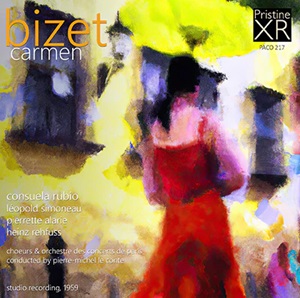
Georges Bizet (1838-1875)
Carmen
Carmen – Consuelo Rubio (mezzo-soprano)
Don José – Léopold Simoneau (tenor)
Micaëla – Pierrette Alarie (soprano)
Escamillo – Heinz Rehfuss (baritone)
Chœurs des Concerts de Paris & Les Petits Chanteurs de Saint-Nicolas
Orchestre des Concerts de Paris/Pierre-Michel Le Conte
rec. 1959, Paris, France
Reviewed as 24-bit FLAC download
Stereo XR remastering
Pristine Audio PACO217 [141]
This recording tends to be overlooked – indeed, I omitted to cover it in my selective survey of Carmen – perhaps because, despite the celebrity of the married couple Simoneau and Alarie, neither of the other two principal singers, nor the conductor, fine artists though they were, was particularly well-known or much recorded – and Consuelo Rubio died young. Furthermore, the release of this recording was overshadowed by the altogether starrier one from HMV/EMI in the same year conducted by Beecham starring de los Ángeles, Gedda, Micheau and Blanc.
I recently reacquainted myself with Abbado’s 1977 studio recording made in the wake of live performances at the Edinburgh Festival, and while that has its virtues, it is predominately rather dull, whereas this performance positively sparkles. As James Altena’s note points out, this is delivered in what was essentially the authentic French, opéra-comique style, with much lighter voices and at a faster tempo than we have perhaps become accustomed to. It is also directed by a conductor with a background mainly in lyric opera and operetta. I am indebted to an email from Ron Grames correcting the original posting of this review: “Le Conte recorded the version with recitatives by Ernest Guiraud, not the Opéra-Comique version. (The recitatives, of course, replaced the dialogue.) There is only a very small cut in the Escamillo – Don José scene just before they begin the knife fight in Act III (No. 22). Everything else is there from that version.” For some listeners the use of sung recitative rather than spoken dialogue will be a bonus; others like me will demur – although to be fair, none of the four main singers was mainland-France-born, Rubio being Spanish, Rehfuss Swiss-born and later naturalised American, and Simoneau and Alarie French-Canadian, so perhaps it is just as well.
Its nearest relation is André Cluytens’ 1950 studio recording, the first I assessed in my survey and which I recommended as the best mono version. I called that “a souvenir of a vanished style” and much the same applies here, except that Simoneau is much lighter voiced than Raoul Jobin. It is evident right from the overture that Le Conte’s way with the score is swift, neat and incisive, even if his orchestra is a bit scratchy. He moves the score along without undue haste and passages such as the Act II “Les tringles des sistres tintaient” are especially invigorating. We also hear in the comprimario roles of Moralès and Zuniga and the chorus real French voices: elegant, with a quick vibrato. They are hardly sophisticated and individual voices obtrude in what sounds like quite a small choral ensemble, but they are entirely at ease in the idiom. After all, they are an earthy crowd – although the contrast between the boys’ angelic upper and trenchant lower registers is somehow oddly touching. Alarie’s Micaëla is indeed soubrettish but also youthful and charming. Neither Simoneau nor Rubio makes much of an impact on their respective entrances, but her French is very good and her mezzo is richer and heftier than I remember it from her recording of Marguerite in 1958; she was obviously transitioning from soprano to darker-voiced roles and sings well. The problem is that her Carmen is rather neutrally characterised; she is neither the ruthless, dangerous femme fatale nor the insouciant “liberated woman” with some class, and as a result just emerges as a bit matronly. Simoneau sounds so boyish and naïve, one wonders if he can convince later as a homicidal maniac; of that more anon. I keep hearing in his Don José the gentle fisherman Nadir from Bizet’s other hit which Simoneau so successfully recorded in 1953. Perhaps I am too habituated to tenors such as Corelli, Del Monaco and Vickers as José, but I do find that Simoneau lacks tonal weight. (The ideal French José is Georges Thill.) Simoneau’s big aria is a major litmus test: it is sweetly but pallidly sung; his tenor simply does not have the heft to embody its desperate passion. In the violent dénouement, for all Rubio’s efforts to inject some electricity into their exchange, his “C’est moi” sounds as if he has dropped by to return a borrowed book.
Heinz Rehfuss is a similarly refined artist – I especially admire him in Mozart operas and the Mahler Lieder he recorded – but he significantly lacks the swagger, sexual allure and vocal lustre of other exponents of this role such as Robert Massard, Robert Merrill et al; moreover, his top notes are cloudy and lack resonance. His Escamillo sounds more like a dancing master than a bullfighter.
Pristine has cleaned and “lifted” the sound without making it too reverberant, although the strings still sound rather thin – which is perhaps an accurate reflection of the original orchestral sound rather than any deficiency in engineering. I should further note, however, that Mr Grames observes of the Urania issue of this performance: “I own it and have compared it with the Pristine. The strings and voices sound much stronger in the direct, forward monaural sound of the Urania transfer from LP, and fuller without the thinness of tone introduced by the comparative brightness of Rose’s EQ and the softening brought about by the “ambient stereo” processing.”
This is…interesting for the manner in which it preserves a certain style, but ultimately fails to convey the emotional clout of Bizet’s score.
Ralph Moore
Availability: Pristine ClassicalOther cast:
Frasquita – Maria Lopez (soprano)
Mercédès – Francine Arrauzau (mezzo-soprano)
Le Dancaïre – José Serrano (baritone)
Le Remendado – Pierre Louvier (tenor)
Moralès – Bernard Delacroix (baritone)
Zuninga – Pablo Ferme (bass)


















